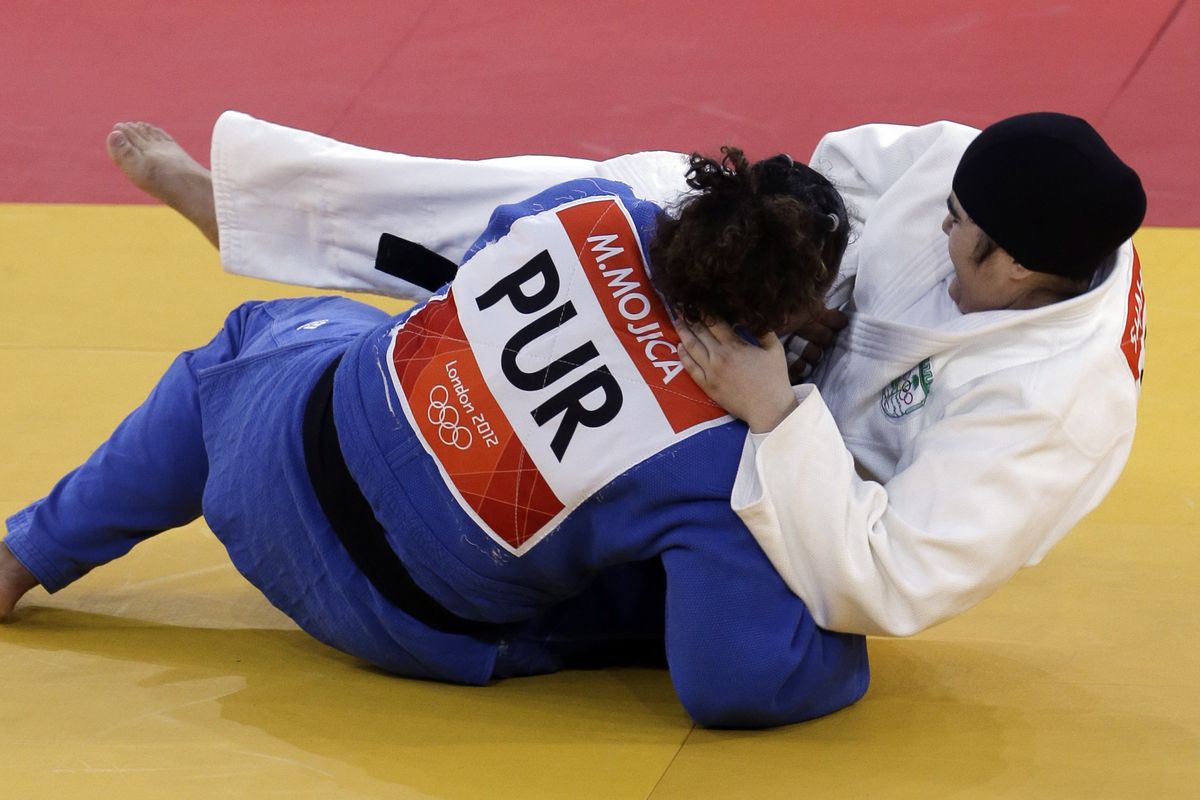Saudi teen puts courage on display just by taking part in games

LONDON – She was still shaking when they led her off the mat, her giant hand trembling in the tiny palm of her Olympic escort.
“I was a scared a lot,” said Wojdan Shaherkani, who may be the toughest woman at these Olympics.
She was still crying when they led her toward the locker room, wrapped in her brother’s arms, trying vainly to pinch the tears from her large, dark eyes. Yet the sobs of defeat settled on her cheeks in pools of victory. She had lost a heavyweight judo match in less than two minutes but may have helped alter a course of centuries.
“Hopefully, this is the beginning of a new era,” she said.
The most overused word at the Olympics is “courage,” but on a historic, heart-thumping Friday morning at the ExCeL Centre, it wrapped itself as tightly around Wojdan Shaherkani as that black scarf around her head.
With some in her country calling her one of the “Prostitutes of the Olympics,” with her country’s television network refusing to broadcast the match, with her own neighbors perhaps whispering of her shame, Shaherkani became the first female athlete from Saudi Arabia to compete in an Olympic event.
As a novice. As a sucker. As a sacrificial pawn played by a country whose leaders didn’t want her here anyway.
Around her white robe, the 16-year-old was wearing a black belt even though she is not even close to qualifying for a black belt. She had been practicing the sport for only two years. The Olympics were her first official judo competition.
One of two female Olympic athletes from her country, she was thrown into the games by a Saudi government that finally caved into pressure from the International Olympic Committee. She had never been out of the country. She didn’t know she would be competing until a couple of days ago, when judo’s governing body finally met her country’s demand that she wear a modified hijab.
Only when the 241-pounder finally took the mat against Puerto Rico’s Melissa Mojica at midmorning Friday did the world see the posturing’s real and painful truth.
This giant symbol was really just a frightened, lost little girl.
Shaherkani didn’t seem to know where to stand. She seemed to have no idea how to move. She certainly didn’t want to fight. She immediately began walking backward while lightly swatting several times at Mojica, who appeared to look at her with a sort of maternal kindness.
“Poco,” Mojica said in Spanish when asked later if she had gone easy on Shaherkani. “Poco.”
Mojica, the 24th-ranked judo competitor in the world, circled Shaherkani for about a minute before finally deciding to put them both out of their misery. Mojica dived, grabbed, dumped Mojica on her back, and the match ended less than a minute and a half after it began.
“I did not feel pity for her,” Mojica said later. “I felt a lot of respect.”
When Shaherkani rose to her feet, her first concern was tucking her hair back up under her black headscarf, which had been jostled during the fall. Her second concern was finding her father, Ali, which she did on the walk from the mat to the tunnel underneath the stands.
For several long minutes, as cheers thundered around her, the rebel duo hugged and cried.
“I was scared a lot, because of all the crowd around, and I lost because this is the first time,” she said.
She gave those quotes to Olympic workers but did not speak to print media, and in the post-match media line, her handlers moved her behind an extra set of barriers so she wouldn’t be touched by the protruding male hands and their microphones. When one of her coaches tried to speak, he was silenced. When she was asked a question by the print media, her Saudi representative answered.
“I feel this is a milestone we’ve achieved,” Hani Kamal Najm said.
It is an era that will continue with Sarah Attar, a Pepperdine University student who competes for Saudi Arabia next week in the 800-meter run. There are also female athletes here for the first time from the Muslim countries of Qatar and Brunei.
Shaherkani is truly the most underqualified athlete at these games, but how can she gain experience in a country where women do not publicly play sports? Saudi Arabia is also the only country in the world where women are banned from driving. Women also can’t work, marry, divorce or travel abroad without the permission of a male relative.
Many in her country are condemning her and Attar’s appearance here, with the “Prostitutes of the Olympics” becoming a Twitter hashtag. Yet watching Wojdan Shaherkani staring down humiliation for the sake of breaking chains that are impossible to comprehend, I was thinking she is something else to these Olympics. Something like its hero.